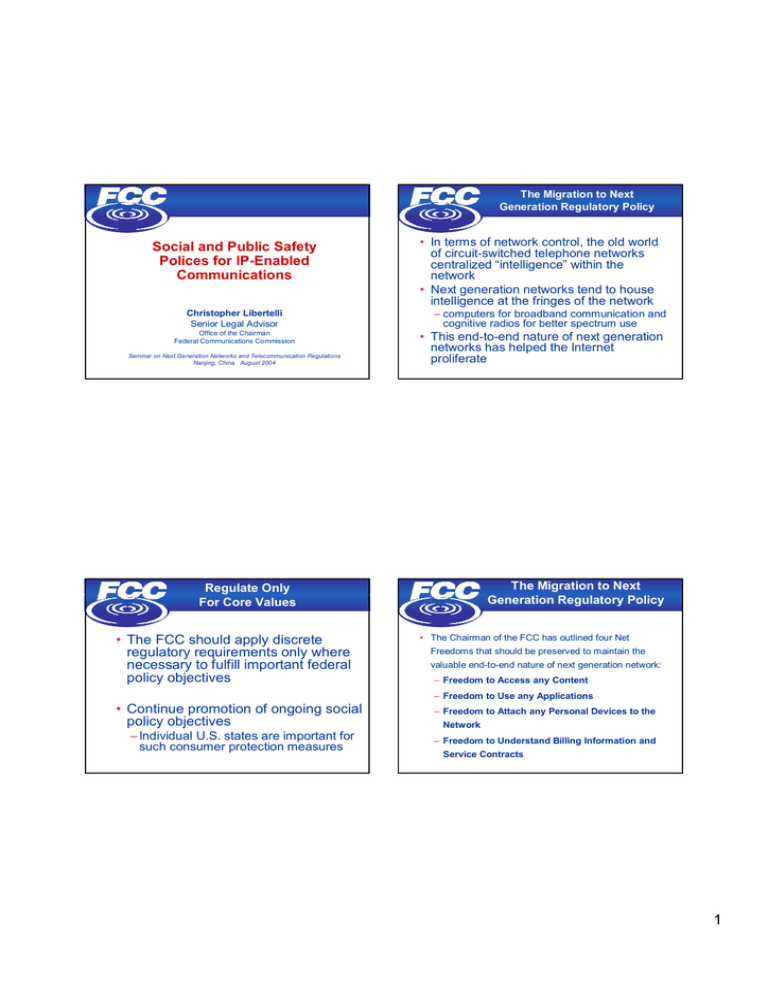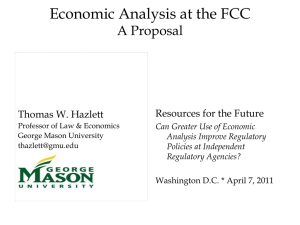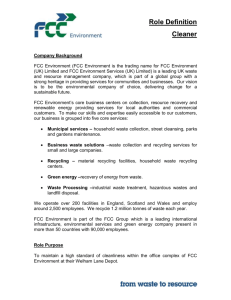Social and Public Safety Polices for IP-Enabled
advertisement

The Migration to Next Generation Regulatory Policy Social and Public Safety Polices for IP-Enabled Communications Christopher Libertelli Senior Legal Advisor Office of the Chairman Federal Communications Commission Seminar on Next Generation Networks and Telecommunication Regulations Nanjing, China August 2004 • In terms of network control, the old world of circuit-switched telephone networks centralized “intelligence” within the network • Next generation networks tend to house intelligence at the fringes of the network – computers for broadband communication and cognitive radios for better spectrum use • This end-to-end nature of next generation networks has helped the Internet proliferate The Migration to Next Generation Regulatory Policy Regulate Only For Core Values • The FCC should apply discrete regulatory requirements only where necessary to fulfill important federal policy objectives • The Chairman of the FCC has outlined four Net Freedoms that should be preserved to maintain the valuable end-to-end nature of next generation network: – Freedom to Access any Content – Freedom to Use any Applications • Continue promotion of ongoing social policy objectives – Individual U.S. states are important for such consumer protection measures – Freedom to Attach any Personal Devices to the Network – Freedom to Understand Billing Information and Service Contracts 1 FCC’s IP-Enabled Services Proceeding • Notice of Proposed Rulemaking released on March 10, 2004 • Proceeding to question the regulation of IP-enabled services • Policy Concerns – universal service, law enforcement access, emergency 911, and access to people with disabilities The Communications Assistance for Law Enforcement Act • The Communications Assistance for Law Enforcement Act (CALEA) was enacted in response to rapid advances in telecommunications technology that threaten the ability of law enforcement officials to conduct electronic surveillance • The FCC adopted a Notice of Proposed Rulemaking responding to a petition from US law enforcement agencies seeking to further update wire tap laws for IP-Enabled communications Universal Service • FCC’s goal is to foster a system of universal service that is fair to all competitors in an increasingly competitive marketplace • IP communications represent a real opportunity to advance our universal service objectives, including ubiquity and affordability • New technology can reduce the costs of providing supported services, particularly in the higher-cost areas of our country • The introduction of technologically advanced, lower-cost networks also can have a positive effect on the high-cost fund over time, thereby limiting the burden our policies place on consumers Emergency Call Services • The FCC is currently working through the technical feasibility of E911 calling services on cellular telephone networks • The FCC established the Wireless E911 Coordination Initiative to bring together stakeholders to share experiences and devise strategies for expediting wireless E911 deployment 2 Emergency Call Services • In the IP-Enabled Services NPRM, the Commission sought comment on the feasibility of similar services over IP-Enabled services • E911 Internet Policy Working Group Solution Summitt: March 18, 2004 • The Commission hopes that industry consensus with respect to 911 implementation over IPEnabled networks proceeds similar to how it has in the cellular industry Access to People with Disabilities • Technology has consistently permitted Americans with disabilities to become more integrated and productive in their daily lives • FCC will not allow Internet-based services to fall short of this precedent • Confident that the industry will respond appropriately to ensure access by individuals with disabilities Thank You! – For more information • FCC Internet site: www.fcc.gov • FCC VoIP Internet site: www.fcc.gov/voip • E-mail: christopher.libertelli@fcc.gov 3




